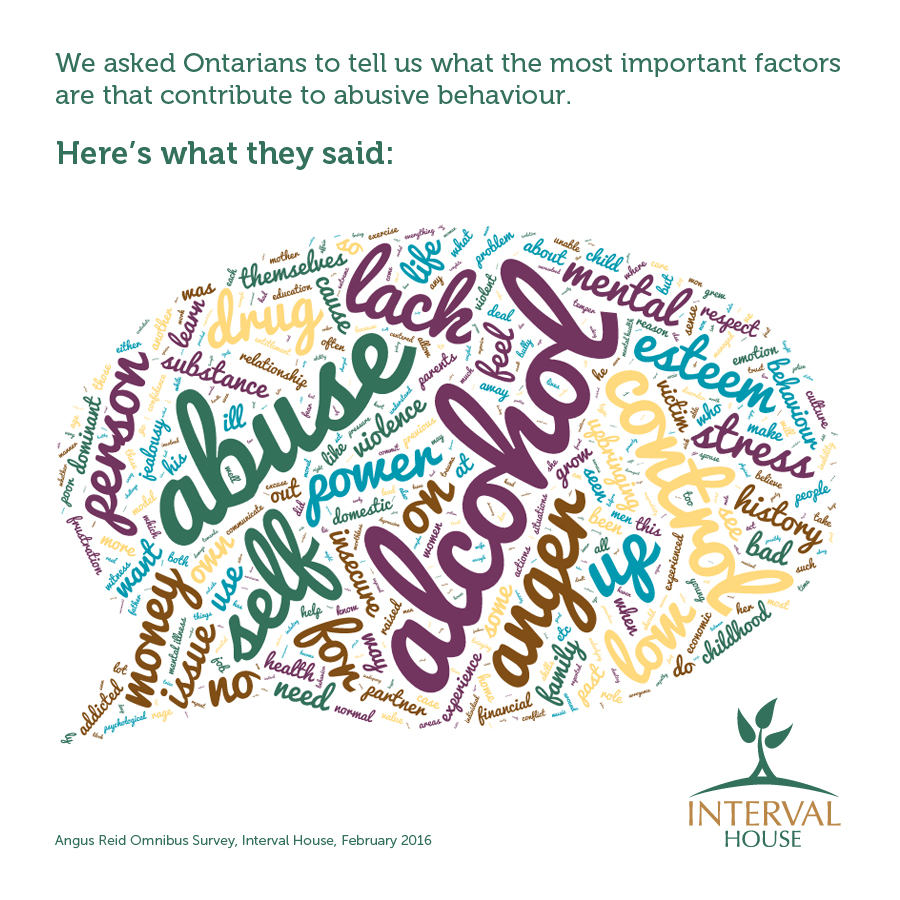
In February of this year, Interval House posed this question to Ontarians through an Angus Reid Omnibus Survey: “What are the most important factors that contribute to abusive behaviour?” We let them answer in their own words and used the most common responses to make a word cloud. Each week for the next month, we’re addressing a common attitude about the causes of domestic violence to investigate: is it true? Or is it a myth? In this post, we answer: does substance abuse cause domestic violence?
When we asked Ontarians what the most important factor was that contributes to someone being abusive, “alcohol” was the word used the most. “Drug” and “substance” were also common words used in responses.
 This is a common belief: that abusers are violent because they’re out of control when they’re drunk or high. Is it true?
This is a common belief: that abusers are violent because they’re out of control when they’re drunk or high. Is it true?
FALSE: While the belief that substance abuse causes domestic violence is a commonly-held opinion, it’s not supported by fact. The reality is, the relationship between substance abuse and domestic violence is more complicated.
The idea that an abuser is “out of control” when he becomes violent towards his partner, is actually usually unfounded. A study showed that “the average amount of alcohol used prior to most episodes of intimate violence is often far less than imagined – usually about an ounce” (equal to a glass of wine or beer).1
It is true that there are many domestic abusers who also abuse substances, and vice versa. Research has shown that about half of the men in batterer intervention programs appear to have substance abuse issues, and half the men in substance abuse programs have battered an intimate partner in the past year.2
But this isn’t a matter of causation: just because both things often happen at the same time doesn’t mean that one causes the other.
The thing is, if domestic violence was caused by an abuser’s use of drugs and alcohol, then the violence should stop when they stop drinking or using drugs. But this usually isn’t the case.
Studies have shown that substance abuse might intensify the frequency or severity of violence for some abusers.3 For others, using drugs or alcohol might be used as an excuse for becoming violent.4 And for others, both their abuse of drugs and alcohol and their domestic violence might manifest from an underlying need for power and control.5
The reality is that “the relationship between SA [substance abuse] and IPV [intimate partner violence] is strongest for those men who already think IPV is appropriate in certain situations.”6 So, while abusive partners may be more prone to substance abuse and substance abusers more prone to partner abuse, the most important reason why men abuse is that they think it’s acceptable to do so.
While it’s not the cause of domestic violence, substance abuse is still a deeply related issue and a serious health problem. And it’s not only common amongst abusers: it’s also very common for survivors of violence to abuse alcohol or drugs. There are a couple of reasons for this.
For one, women struggling with addiction may be more marginalized and have less power and economic resources, making them more vulnerable to violence and less able to break free of abusive relationships.
On the other hand, for women who have survived violence, abusing substances can be a coping mechanism to deal with the trauma of what they’ve experienced.
Stay tuned for the next post in our myth-busting series, where we tackle the question: does mental health, anger, or stress cause domestic violence?
- Part 1: What are the causes of domestic violence?
- Part 2: Does substance abuse cause domestic violence?
- Part 3: Does mental illness or anger cause domestic violence?
- Part 4: Does a history of childhood abuse cause abusive behaviour?
- Part 5: Is domestic violence about power and control?
Sources:
- http://www.vawnet.org/applied-research-papers/print-document.php?doc_id=1324
- http://www.vawnet.org/applied-research-papers/print-document.php?doc_id=1324
- http://www.vawnet.org/applied-research-papers/print-document.php?doc_id=1324
- https://www1.umn.edu/humanrts/svaw/domestic/link/alcohol.htm
- http://www.vawnet.org/applied-research-papers/print-document.php?doc_id=1324
- http://www.ncbi.nlm.nih.gov/books/NBK64441/

